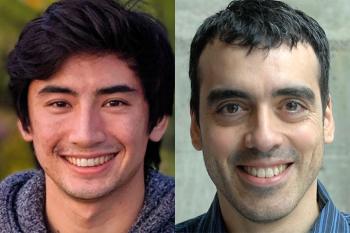
Image Caption
L-R: Altschuler, Parrilo. Courtesy of Altschuler and Parrilo.October 17, 2025
LIDS alum Jason Altschuler SM '18, PhD '22 and PI Pablo Parrilo have received the 2025 ICS Prize for their pioneering work on accelerating gradient descent through stepsize hedging. The INFORMS Computing Society (ICS) Prize is an annual award for the best English language paper or group of related papers dealing with the Operations Research/Computer Science interface. The awarded papers are “Acceleration by Stepsize Hedging: Multi-Step Descent and the Silver Stepsize Schedule,” and “Acceleration by Stepsize hedging: Silver Stepsize Schedule for Smooth Convex Optimization”. The award ceremony will take place in late October, at the upcoming INFORMS Annual Meeting in Atlanta.
The prize acknowledges Altschuler and Parrilo for their pioneering work on accelerating gradient descent through stepsize hedging. “Their research introduced the novel concepts of Silver Stepsizes, stepsize hedging, and multi-step descent, demonstrating that acceleration is possible in gradient descent solely through dynamic choice of stepsizes, a breakthrough overturning decades of conventional wisdom,” notes INFORMS Computing Society Chair, Thiago Serra. “By developing innovative techniques such as recursive gluing, they established improved convergence rates and inspired a new line of research in the design and analysis of optimization algorithms. Their work has already had a significant impact across convex optimization and machine learning.”
Jason Altschuler (SM ‘18, PhD ‘22) is currently an Assistant Professor in the Wharton Department of Statistics and Data Science, the Department of Electrical Engineering (by courtesy), and the Department of Computer Science (by courtesy). He is also an affiliated faculty member in Applied Mathematics, the PRiML Center for Machine Learning, and the Warren Center for Networks and Data Science. Altschuler’s research interests are broadly at the interface of optimization, probability, and machine learning, with a focus on the design and analysis of large-scale algorithms. He received an undergraduate degree from Princeton, and a PhD in Electrical Engineering and Computer Science from MIT. He is interested in practical implementations as well as theory, and has spent time in both tech (Apple Research, Google Research) and on Wall Street (DE Shaw, Tower Research).
Pablo Parrilo is the Joseph F. and Nancy P. Keithley Professor of Electrical Engineering and Computer Science at MIT, with a joint appointment in Mathematics. He is affiliated with the Laboratory for Information and Decision Systems (LIDS) and the Operations Research Center (ORC). Past appointments include Assistant Professor at the Automatic Control Laboratory of the Swiss Federal Institute of Technology (ETH Zurich), and Visiting Associate Professor at the California Institute of Technology. He received an Electronics Engineering undergraduate degree from the University of Buenos Aires, and a PhD in Control and Dynamical Systems from the California Institute of Technology.
His research interests include mathematical optimization, machine learning, control and identification, robustness analysis and synthesis, and the development and application of computational tools based on convex optimization and algorithmic algebra to practically relevant engineering problems.
Parrilo has received several distinctions, including the Donald P. Eckman Award of the American Automatic Control Council, the SIAM Activity Group on Control and Systems Theory (SIAG/CST) Prize, the IEEE Antonio Ruberti Young Researcher Prize, and the Farkas Prize of the INFORMS Optimization Society. He is an IEEE and SIAM Fellow.
INFORMS is the largest professional association for the decision and data sciences.Home to a diverse collection of academic and industry experts in the data and decision sciences, including operations research, analytics, management science, economics, behavioral science, statistics, artificial intelligence, data science, applied mathematics, and more, INFORMS is driven by the belief that members and their work are helping to make smarter decisions for a better world.
Learn more and read the papers: “Acceleration by Stepsize Hedging: Multi-Step Descent and the Silver Stepsize Schedule” and “Acceleration by stepsize hedging: Silver Stepsize Schedule for smooth convex optimization.”


